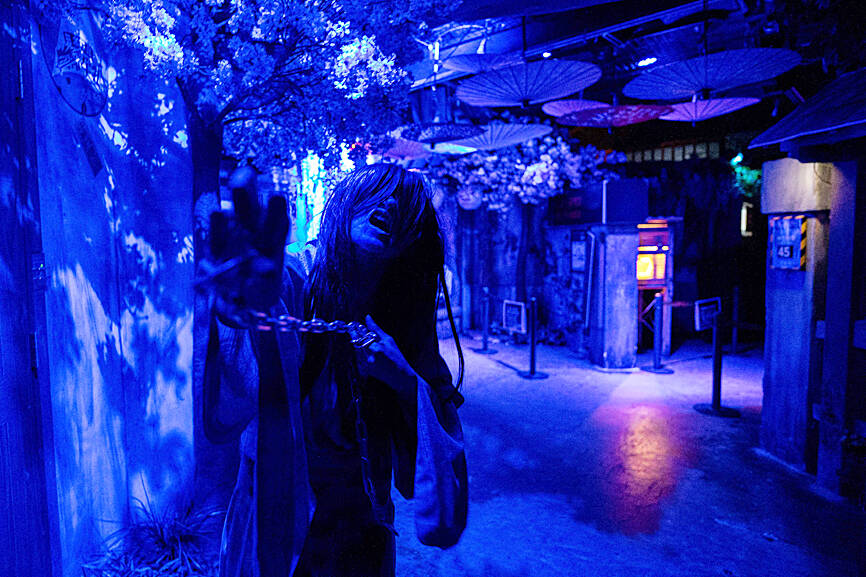Halloween might not be for a few months, but it is already peak haunted house season in Japan, where seeking a bone-chilling fright is a long-established summer tradition.
Kimono-clad ghosts with bloody eyes convulse in agony and lurch toward visitors at one spooky establishment in Tokyo, roaming around groaning like zombies.
Summer is closely associated with the dead in Japan, because it is believed that ancestral souls return to their household altars during the mid-August “obon” holiday.

Photo: AFP
So a visit to a haunted house is seen as a refreshing respite from the season’s often stultifying heat and humidity — thanks to air-conditioning and the less tangible chills sent down one’s spine.
Emerging from the dimly lit attraction at the indoor theme park Namjatown, 18-year-old Misato Naruse told reporters that she had gone there with her friend Himari Shimada “to get cool.”
“I broke out in a cold sweat without even realizing. That’s how scared I was, I guess,” the university student said beside a drained and speechless Shimada, also 18.
“Last year it was very hot, but this year it feels even hotter. And I wonder how much hotter it will be in a few years’ time,” Naruse said.
Many haunted houses in Japan play up to their refreshing reputation by using slogans such as “a shudder that blows away the summer heat.”
The idea can perhaps be traced back to the Japanese traditional theatre form of kabuki, said Hirofumi Gomi, who has worked behind-the-scenes as a producer of haunted house experiences for three decades.
Lore has it that a few centuries ago, kabuki theaters struggled to lure spectators in summer because many loathed being crammed inside without air-conditioning, but that changed when performers swapped sentimental human drama for full-on horror — aided by tricks and contraptions, similar to a modern-day haunted house.
“For patrons wilting under the heat, dazzling visual effects and gripping ghost tales were more bearable than the subtleties of human-interest stories,” Gomi said. “So maybe haunted houses don’t so much cool you down as make you forget the heat momentarily.”
At the Namjatown haunted house, which is meant to evoke an abandoned, spirit-infested town, organizers are confident about the scary tricks up their sleeves.
“In Japanese, we say: ‘Kimo ga hieru,’ or literally: ‘Chilling the liver’ — a reference to the sensation of getting goosebumps,” said Hiroki Matsubara, of operator Bandai Namco Amusement. “We believe visitors can experience the feeling of being scared, surprised or ‘chilled to the liver,’ which will hopefully help them enjoy a cool feeling in summer.”

In the sweltering streets of Jakarta, buskers carry towering, hollow puppets and pass around a bucket for donations. Now, they fear becoming outlaws. City authorities said they would crack down on use of the sacred ondel-ondel puppets, which can stand as tall as a truck, and they are drafting legislation to remove what they view as a street nuisance. Performances featuring the puppets — originally used by Jakarta’s Betawi people to ward off evil spirits — would be allowed only at set events. The ban could leave many ondel-ondel buskers in Jakarta jobless. “I am confused and anxious. I fear getting raided or even

POLITICAL PATRIARCHS: Recent clashes between Thailand and Cambodia are driven by an escalating feud between rival political families, analysts say The dispute over Thailand and Cambodia’s contested border, which dates back more than a century to disagreements over colonial-era maps, has broken into conflict before. However, the most recent clashes, which erupted on Thursday, have been fueled by another factor: a bitter feud between two powerful political patriarchs. Cambodian Senate President and former prime minister Hun Sen, 72, and former Thai prime minister Thaksin Shinawatra, 76, were once such close friends that they reportedly called one another brothers. Hun Sen has, over the years, supported Thaksin’s family during their long-running power struggle with Thailand’s military. Thaksin and his sister Yingluck stayed

Kemal Ozdemir looked up at the bare peaks of Mount Cilo in Turkey’s Kurdish majority southeast. “There were glaciers 10 years ago,” he recalled under a cloudless sky. A mountain guide for 15 years, Ozdemir then turned toward the torrent carrying dozens of blocks of ice below a slope covered with grass and rocks — a sign of glacier loss being exacerbated by global warming. “You can see that there are quite a few pieces of glacier in the water right now ... the reason why the waterfalls flow lushly actually shows us how fast the ice is melting,” he said.

RESTRUCTURE: Myanmar’s military has ended emergency rule and announced plans for elections in December, but critics said the move aims to entrench junta control Myanmar’s military government announced on Thursday that it was ending the state of emergency declared after it seized power in 2021 and would restructure administrative bodies to prepare for the new election at the end of the year. However, the polls planned for an unspecified date in December face serious obstacles, including a civil war raging over most of the country and pledges by opponents of the military rule to derail the election because they believe it can be neither free nor fair. Under the restructuring, Myanmar’s junta chief Min Aung Hlaing is giving up two posts, but would stay at the